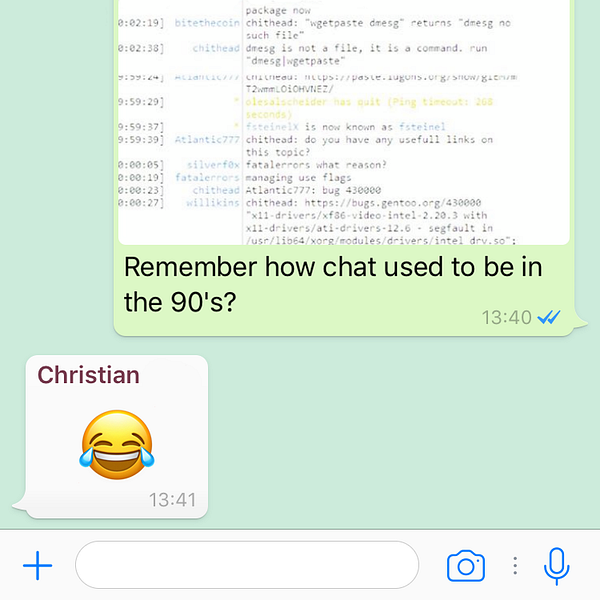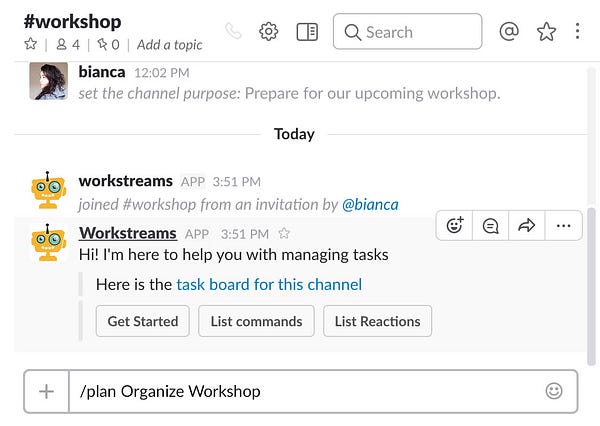In May of 2012, just 4 weeks before the official date, the opening of Berlin’s new international airport is announced to be delayed for another couple of weeks. Weeks became months and months became years. The latest prediction for its actual opening is late 2018.
There is a huge mismatch between planned progress and actual progress in projects.
When a project is delayed as dramatically as the Berlin airport, it is obviously the result of more than one problem. And yet this mega-project shares most of the common reasons why so many projects delay or fail: poor communication, unrealistic time estimates, and political games which can outbalance even the most elaborate planning and processes.
New technology lays the groundwork for rethinking project-management.

What started in technology companies some years ago is hitting mainstream business now: the replacement of Email by Chat. WhatsApp, WeChat and Messenger have introduced the average citizen to the advantages of instant messaging. They paved the way for business-oriented chat-solutions like Slack, which combine the power of old-school chat applications like IRC with the ease of modern mobile messaging apps. Slack is being widely adopted by Startups, and Microsoft is now pushing its equivalent Teams app to the more conservative markets.
The dawn of this new era also opens up new possibilities for project-management software: together with the advancements currently being made in machine learning, new chat technologies lay the groundwork for the development of a project-management AI.
It all starts with a paradigm shift.

One of the candidates in this race to define a new standard is a Slack App called Workstreams. It’s the first project-management software built entirely on the chat infrastructure of Slack. While traditional project-management software is designed to be the center of all planning and communication, the Workstreams team takes a different approach: they regard the existing communication channels of a company as the true center of work coordination. Processes and tools must embrace those channels and therefore be embedded into them. Christian Bick, Product Manager at Workstreams, points out why this paradigm shift is so important:
To make accurate predictions and to give meaningful insights, software must become an active participant of our communication channels. This way, it can learn about how information flows between team members and project partners.
AI will first improve our communication, and then correct our optimism-bias.
It makes sense: no human can keep track of all the information exchanged within a project. However computers are masters of monitoring communication, and in the future that is exactly what they will do. It’s not yet necessary for a machine to reach a human level of understanding; what matters is knowing who shares information, on which topic, and when. This knowledge is already enough to identify poor communication between collaborators before it develops into expensive problems. Artificial Intelligence will not only detect these kind of issues — it will also suggest actions for solving them.
AI will become responsible for making more accurate estimates about a project’s progress. Modelling a project’s information flow can be used for characterizing and classifying projects. In order to make precise predictions, an AI would need to learn from thousands or millions of reference projects. The communication structure within those projects will play a dominant role in an AI’s training.
There is an elephant in the room! Right there!
Even when an AI is integrated with our digital conversations, it would still miss out on our primary way of communicating as humans. A lot of, if not most of the important information exchanged takes place offline in face-to-face meetings. The Workstreams team suggests a simple strategy to address this issue:
An AI does not need to be present in a physical meeting to know about the information that has been exchanged. What it really needs to know is that a meeting took place and who took part. With digital calendars being the standard already, that’s trivial.
The information on the meeting time and participants already lives online. If the agenda and results of a meeting are not digitally distributed, then the AI would draw attention to that anyways because it is responsible for ensuring information sharing. Anyway, computers are already beginning to be integrated into physical meetings due to recent innovations in audio recording and recognition.
Welcome your new team-member — it’s not exactly John Cleese
So, when this vision comes true, will managers have to fear for their jobs? Even though computers will be better than humans at generating predictions and insights, there is something that Artificial Intelligence will not have for a long time: the capability of understanding the uniqueness of human relationships. It will remain the responsibility of teams and managers to evaluate an AI’s findings and to put those suggestions into a bigger context. What the Workstreams team has in mind is a distribution of labor:
Our goal is to add a valuable member to today’s teams — one with unique skills in communication and assessment. Don’t expect your new mate to be overly creative and funny though. That’s a human’s job. And the most important one.

For now, all of this is just a vision. The Workstreams team is still busy with getting the foundations right. What today looks like a fancy task-management app might soon turn into a revolution in project-management.

There is hope for the Berlin airport.
Intelligent software is here to stay and will become more and more present in daily life. Self-driving cars are already on our doorsteps. Sooner or later the same technologies will integrate with and augment our toolset for digital collaboration. These advances are definitely worth keeping an eye on. Especially when you are planning a trip to Berlin.
This post originally appeared on Bianca’s Medium
Like this article? Subscribe to our weekly newsletter to never miss out!





